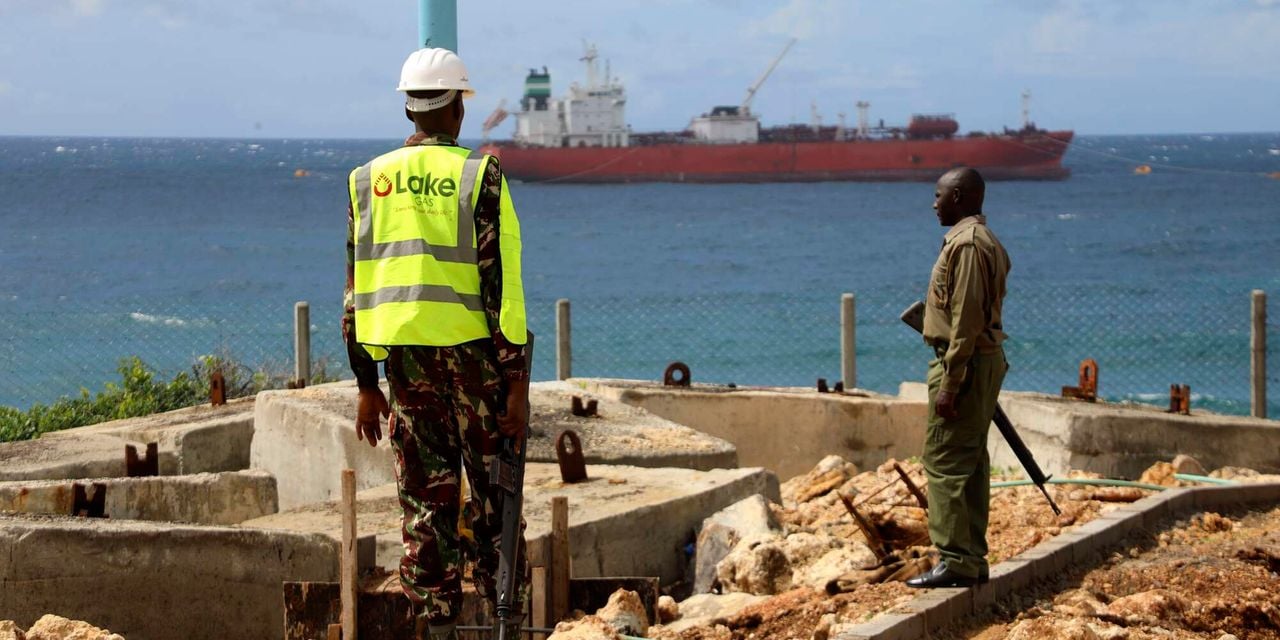News
Condemned Tanzanian Cooking Gas Terminal Completes First Discharge Despite Safety Warnings

Controversial Kilifi LPG facility successfully offloads 10,000 tonnes despite earlier expert concerns over dangerous currents and lack of safety infrastructure
KILIFI, Wednesday June 5, 2025 – A Tanzanian-owned cooking gas terminal in Kilifi County has successfully completed its first cargo discharge operation this week, defying earlier warnings from marine safety experts who had branded the venture as dangerously premature.
The MT Barumk Gas vessel completed the discharge of 10,000 metric tonnes of liquefied petroleum gas (LPG) at Lake Gas Limited’s controversial Vipingo terminal over three days, ending Wednesday. The operation marks a significant milestone for Kenya’s energy sector, but comes amid lingering concerns about the facility’s safety preparedness.
Expert Warnings Ignored
Just two weeks ago, Kenya Ports Authority (KPA) marine pilots had issued stark warnings about attempting such operations during the current season. A KPA simulation conducted in April concluded that discharging gas offshore was “almost impossible” during the May-September period due to strong winds that could result in “vessel drift, cargo spillage and fire or explosion due to hazardous LPG handling.”
The marine experts had specifically recommended that LPG discharge at the terminal should only occur between November and March, with vessels approaching at 6 am when winds are weakest. Despite these recommendations, KPA Managing Director Captain William Ruto had termed the current operation as “a trial.”
“Why did they have to do a trial now with a cargo as dangerous as LPG while the recommendations were very clear in the timings and what needs to be done to safeguard the environment?” questioned a senior marine pilot who requested anonymity.
Legal Troubles Continue
The operation proceeded despite ongoing legal challenges. The National Environmental Tribunal in Nairobi found Lake Gas Limited and development partner Vipingo Development Limited in contempt of a January 2025 order that had halted construction of the 22,000 MT LPG storage facility. Both companies were fined Sh2 million for the contempt.
The tribunal’s initial order came after environmental concerns were raised about the location’s proximity to marine reserves and national parks in Mombasa, Watamu, and Malindi. KPA had found that without proper breakwater systems, marine pollutants could be pushed by northerly currents to these protected areas.
Safety Infrastructure Concerns
A critical safety concern highlighted by KPA was the facility’s need for a breakwater system – a multi-million-dollar investment that Lake Gas Limited had reportedly resisted. The KPA report stated that “the break water system will be essential to prevent negative wave activity and ocean currents during approaches and cargo operations.”
Without this infrastructure, experts warned that the remote location would be vulnerable to unauthorized access or piracy, and that rapid emergency response would be difficult if something went wrong.
The operation also strained KPA’s resources, requiring tugboats to be diverted from the main Mombasa port to assist with the challenging offshore discharge in the strong current zone.
Company Celebrates Success
Despite the controversy, Lake Gas Limited hailed the operation as a success. Company CEO and Chairperson Ally Edha Awadh said the three-day operation “tested and validated the entire LPG supply chain, including vessel mooring, subsea pipeline transfer, and onshore storage systems.”
General Manager Maurice Mutiso emphasized that the operation adhered to international safety standards, resulting in “zero incidents or delays.” He described the discharge as “a critical milestone in Kenya’s energy infrastructure development.”
Government Policy Push
The operation aligns with the government’s strategy to increase LPG uptake for cooking. Last December, the Cabinet approved LPG procurement through the Open Tender System, aimed at opening the market to more investors and potentially reducing cooking gas prices for consumers.
The development is part of Kenya’s broader push to transition households from traditional cooking fuels to cleaner LPG. Current market leaders have faced limited competition, and the entry of new players like Lake Gas Limited could help drive down prices.
Market Impact
The company expects the gas to enter the Kenyan market this week, with distribution by trucks across the country. However, the challenging discharge conditions during the monsoon season could impact future operations and costs.
Experts had warned that longer discharge times due to violent sea conditions could result in higher demurrage costs, potentially leading to higher wholesale and retail prices – contrary to consumer expectations of cheaper cooking gas.
Future Operations Uncertain
While Captain Ruto acknowledged that a long-term breakwater system would be necessary for safe operations, he did not specify when this critical infrastructure would be constructed. The successful completion of this trial discharge may embolden Lake Gas Limited to continue operations despite the identified safety concerns.
The Sh8 billion facility represents Tanzania’s Lake Group’s significant investment in Kenya’s energy sector, positioning the company to challenge established LPG players in the East African market.
As Kenya continues its push toward cleaner cooking fuels, the balance between rapid market expansion and safety considerations remains a critical challenge for regulators and industry players alike.
The success of this first discharge, despite expert warnings, sets a precedent that could influence future LPG import operations along Kenya’s coast, though the long-term safety and environmental implications remain to be seen.
Kenya Insights allows guest blogging, if you want to be published on Kenya’s most authoritative and accurate blog, have an expose, news TIPS, story angles, human interest stories, drop us an email on [email protected] or via Telegram
-

 Business2 weeks ago
Business2 weeks agobetPawa Empire Crumbles: Mr Eazi’s Betting Gambit Unravels Amid Partner’s Shadowy Deals
-

 Business1 week ago
Business1 week agoMinnesota Fraud, Rice Saga, Medical Equipment Deal: Why BBS Mall Owner Abdiweli Hassan is Becoming The Face of Controversial Somali Businessman in Nairobi
-

 Business2 days ago
Business2 days agoCooking Fuel Firm Koko Collapses After Govt Blocks Sh23bn Carbon Deal
-

 Politics1 week ago
Politics1 week agoYour Excellency! How Ida’s New Job Title From Ruto’s Envoy Job Is Likely to Impact Luo Politics Post Raila
-

 News1 week ago
News1 week agoDCI Probes Meridian Equator Hospital After Botched Procedure That Killed a Lawyer
-

 Investigations2 weeks ago
Investigations2 weeks agoEXPOSED: SHA Officials Approve Higher Payments for Family, Friends as Poor Patients Pay Out of Pocket
-

 News1 week ago
News1 week agoKenya Stares At Health Catastrophe As US Abandons WHO, Threatens Billions In Disease Fighting Programmes
-

 Politics2 weeks ago
Politics2 weeks agoJaramogi Clan Tells Raila Jr, Winnie Against Disrespecting Their Uncle Oburu, Warns of Curses















